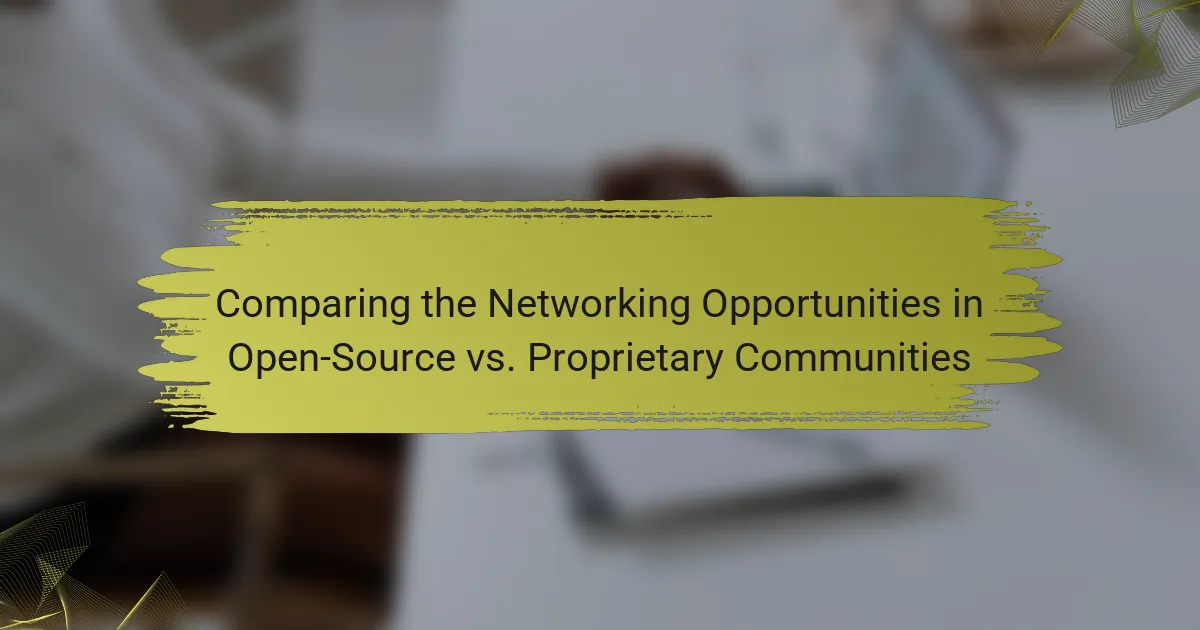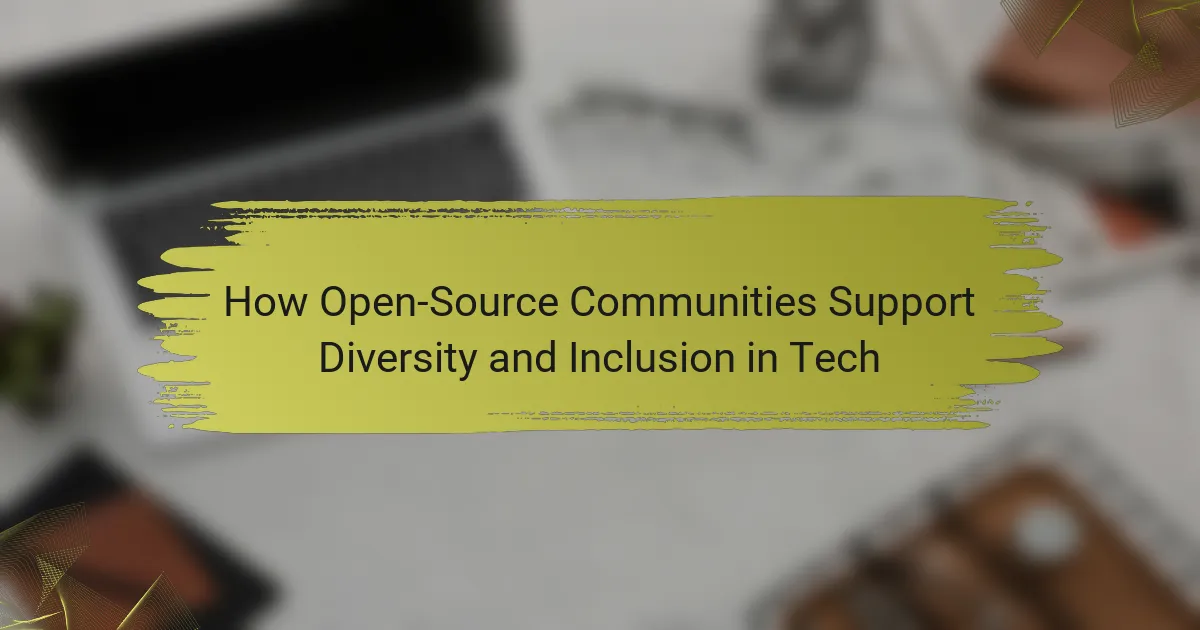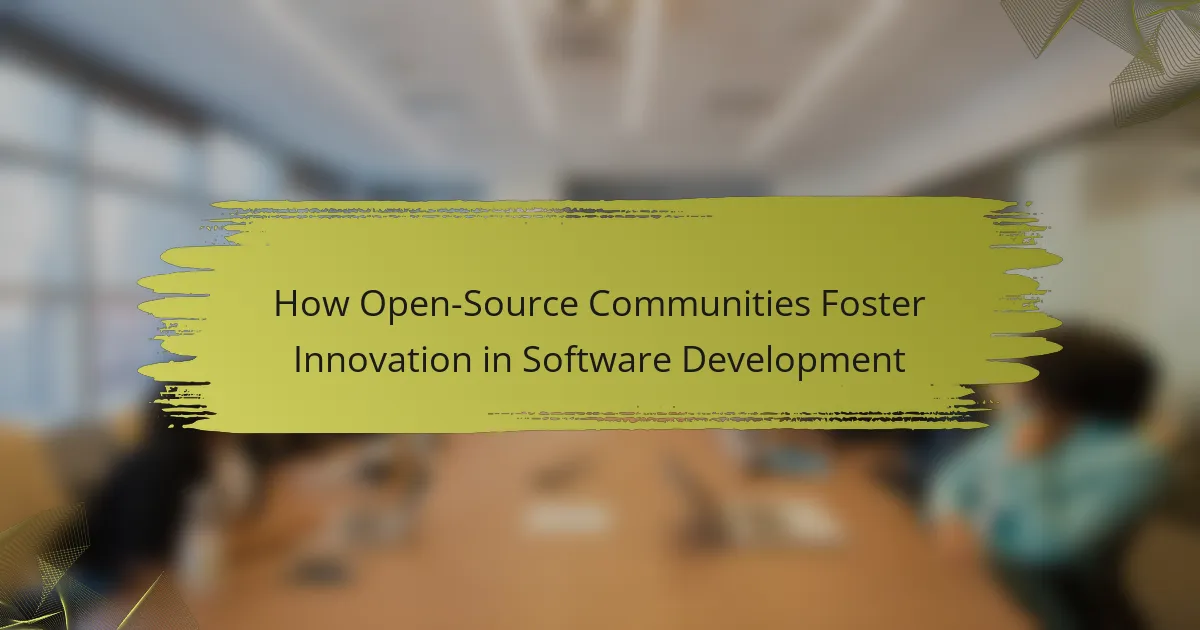When comparing networking opportunities in open-source and proprietary communities, distinct characteristics emerge that cater to different professional needs. Open-source communities emphasize collaboration and inclusivity, fostering diverse connections and skill development through shared projects. In contrast, proprietary communities provide structured networking through corporate-sponsored events, offering direct access to industry leaders and exclusive resources. Understanding these differences can help individuals choose the right environment for their professional growth.
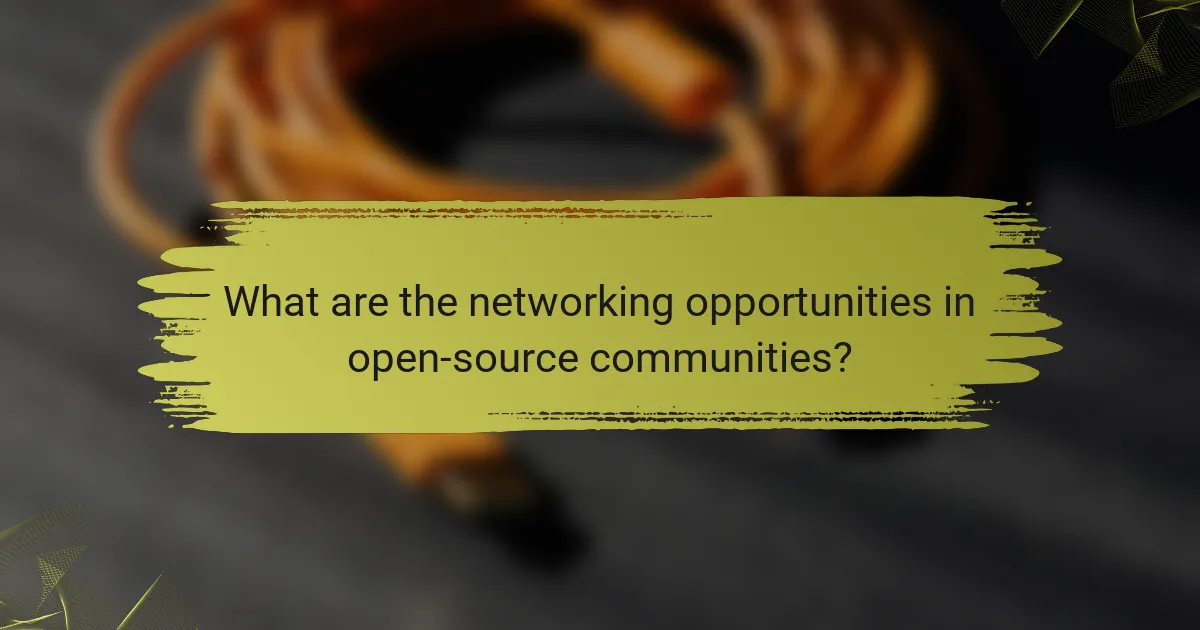
What are the networking opportunities in open-source communities?
Open-source communities offer diverse networking opportunities that facilitate collaboration, knowledge sharing, and professional growth. Engaging with these communities can lead to valuable connections, skill development, and potential career advancements.
Collaborative projects on GitHub
GitHub serves as a central hub for open-source projects, allowing developers to collaborate on code, share ideas, and contribute to various initiatives. Participating in these projects can enhance your visibility within the community and help you build a portfolio of work.
To maximize networking, consider contributing to popular repositories or starting your own project. Engaging with issues, pull requests, and discussions can lead to connections with other contributors and maintainers.
Conferences like FOSDEM
Conferences such as FOSDEM provide excellent networking opportunities for open-source enthusiasts and professionals. These events feature talks, workshops, and networking sessions that allow attendees to meet like-minded individuals and industry leaders.
Attending these conferences can help you stay updated on trends and technologies while fostering relationships that may lead to collaboration or job opportunities. Be proactive in participating in discussions and exchanging contact information with fellow attendees.
Online forums and chat platforms
Online forums and chat platforms, such as Reddit, Stack Overflow, and Discord, are vital for networking within open-source communities. These platforms facilitate real-time discussions, knowledge sharing, and problem-solving among members.
Engaging actively in these spaces can help you establish your presence, seek advice, and offer assistance to others. Building a reputation as a knowledgeable contributor can lead to meaningful connections and potential collaborations.
Mentorship programs
Many open-source communities offer mentorship programs that connect experienced developers with newcomers. These programs provide guidance, support, and networking opportunities for participants, fostering a sense of belonging within the community.
Joining a mentorship program can accelerate your learning and help you navigate the open-source landscape more effectively. Look for programs that align with your interests and goals to maximize the benefits of mentorship.
Local meetups and hackathons
Local meetups and hackathons are excellent ways to network with other open-source enthusiasts in your area. These events often feature collaborative coding sessions, presentations, and discussions that encourage interaction and knowledge sharing.
Participating in these gatherings can help you connect with local developers, learn new skills, and potentially form lasting partnerships. Keep an eye on platforms like Meetup or Eventbrite to find relevant events in your region.

What are the networking opportunities in proprietary communities?
Proprietary communities offer structured networking opportunities primarily through corporate-sponsored events and resources. These environments often facilitate direct connections with industry leaders and provide access to exclusive tools that enhance professional growth.
Exclusive events hosted by companies
Companies frequently organize exclusive events such as conferences, workshops, and seminars for their community members. These gatherings allow participants to meet industry experts, learn about new technologies, and engage in discussions that can lead to collaborations.
Attending these events can significantly enhance your visibility within the industry. Look for opportunities to participate in panel discussions or networking sessions to maximize your connections.
Partnerships with industry leaders
Proprietary communities often foster partnerships with established industry leaders, providing members with unique networking opportunities. These collaborations can lead to mentorship, job placements, and access to insider knowledge.
Engaging with these partnerships can be beneficial for career advancement. Consider reaching out to leaders during networking events or through community forums to explore potential collaborations.
Access to proprietary tools and resources
Members of proprietary communities typically gain access to specialized tools and resources that are not available to the general public. This access can include software, training materials, and research databases that enhance professional skills.
Utilizing these resources effectively can set you apart in your field. Make sure to take full advantage of any training sessions or workshops offered to familiarize yourself with these tools.
Networking through corporate training programs
Corporate training programs often serve as a platform for networking among participants. These programs not only enhance skills but also connect individuals with peers and mentors within the same organization or industry.
Engaging actively in these training sessions can help you build lasting professional relationships. Consider following up with fellow participants after the program to maintain connections.
Membership in professional organizations
Joining professional organizations affiliated with proprietary communities can open doors to extensive networking opportunities. These organizations often host events, provide resources, and facilitate connections among members.
Be proactive in participating in these organizations by attending meetings and contributing to discussions. This involvement can significantly expand your professional network and enhance your career prospects.
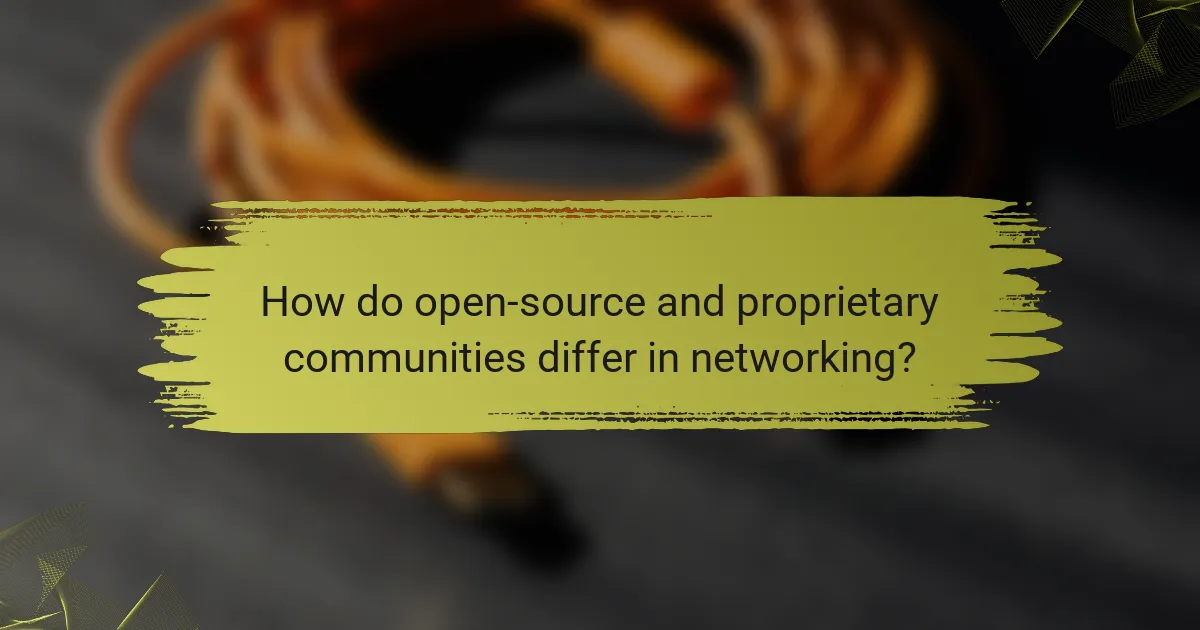
How do open-source and proprietary communities differ in networking?
Open-source communities prioritize collaboration and inclusivity, while proprietary communities often focus on exclusivity and controlled access. This fundamental difference shapes the networking opportunities available within each type of community.
Openness vs. exclusivity
Open-source communities are characterized by their transparent practices, allowing anyone to join, contribute, and share ideas. This openness fosters a diverse network of individuals from various backgrounds, enhancing collaboration and innovation.
In contrast, proprietary communities tend to maintain stricter membership criteria, often limiting access to select individuals or organizations. This exclusivity can create a more homogeneous environment, which may restrict the flow of new ideas and perspectives.
Community engagement levels
Engagement in open-source communities is typically high, with members actively participating in discussions, code contributions, and project management. Regular meetups, online forums, and collaborative platforms facilitate ongoing interaction and relationship-building.
Proprietary communities may have lower engagement levels due to their closed nature. Networking opportunities often rely on formal events or structured communication channels, which can limit spontaneous interactions and the development of personal connections.
Access to resources and support
Open-source communities often provide a wealth of resources, including documentation, tutorials, and forums where members can seek help. This collective knowledge base supports networking by enabling members to learn from one another and share best practices.
In proprietary communities, access to resources may be more restricted, with support often limited to paid services or internal documentation. This can hinder networking opportunities, as members may not have the same level of access to shared knowledge and expertise.

What criteria should you consider when choosing a community?
When selecting a community, consider factors such as goals, available resources, and the overall culture and values. These elements can significantly influence your networking opportunities and personal growth within the community.
Goals and objectives
The goals and objectives of a community shape its direction and the type of networking opportunities available. Open-source communities often prioritize collaboration and innovation, while proprietary communities may focus on product development and market competitiveness.
Evaluate how these goals align with your personal or professional aspirations. For instance, if you seek to contribute to cutting-edge technology, an open-source community may be more suitable than a proprietary one that emphasizes commercial products.
Available resources
Resources within a community can include documentation, mentorship programs, and networking events. Open-source communities typically offer extensive online resources, such as forums and repositories, which can facilitate learning and collaboration.
In contrast, proprietary communities may provide structured resources, including training sessions and exclusive events, but access might be limited to members or partners. Assess what resources are most valuable to you and how accessible they are within each community.
Community culture and values
The culture and values of a community play a crucial role in shaping interactions and relationships. Open-source communities often emphasize inclusivity, transparency, and shared knowledge, fostering a collaborative environment.
On the other hand, proprietary communities may prioritize confidentiality and competitive advantage, which can lead to a more guarded atmosphere. Understanding these cultural differences can help you choose a community where you feel comfortable and supported in your networking efforts.
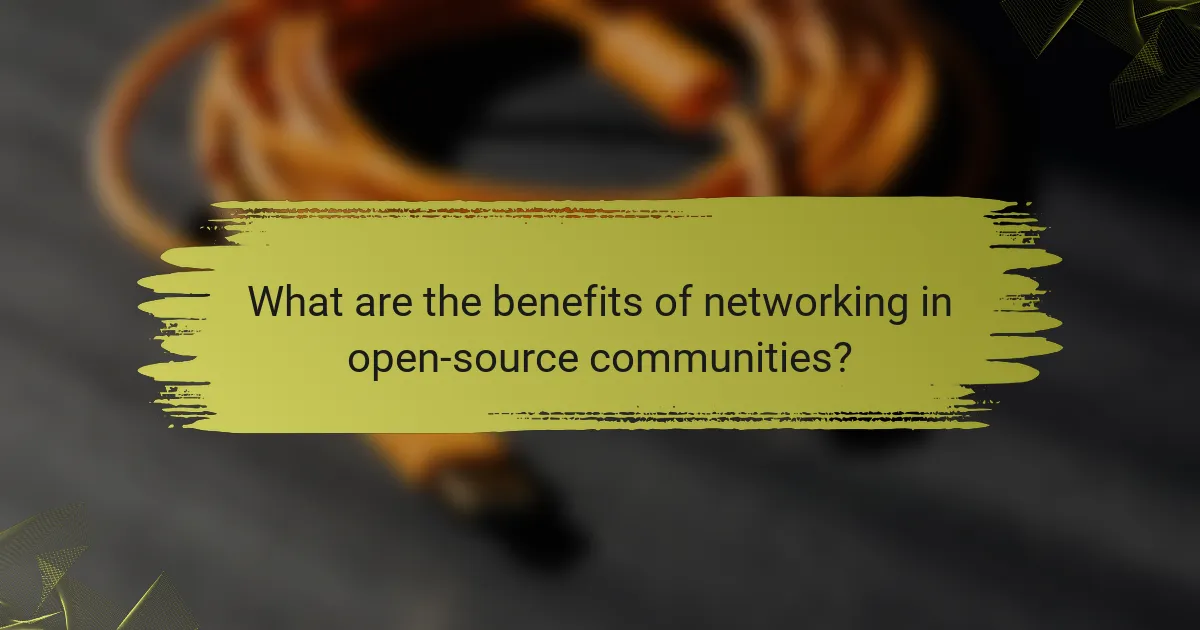
What are the benefits of networking in open-source communities?
Networking in open-source communities offers numerous advantages, including enhanced collaboration and the opportunity to learn from a diverse group of contributors. Engaging with these communities can lead to skill development, access to innovative ideas, and potential career opportunities.
Skill development through collaboration
Open-source communities provide a platform for individuals to collaborate on projects, which fosters skill development. Contributors can learn from one another by sharing knowledge, troubleshooting issues together, and receiving feedback on their work.
Participating in these communities often involves working on real-world projects, which can enhance technical skills and project management abilities. For instance, a developer might improve their coding skills by contributing to a popular open-source software project.
Access to diverse perspectives
Networking in open-source communities exposes individuals to a wide range of perspectives and ideas. Contributors come from various backgrounds, cultures, and experiences, which enriches discussions and leads to innovative solutions.
This diversity can help individuals think critically and approach problems from different angles. For example, a project team might benefit from unique insights provided by contributors from different countries, leading to more robust and globally relevant software solutions.
